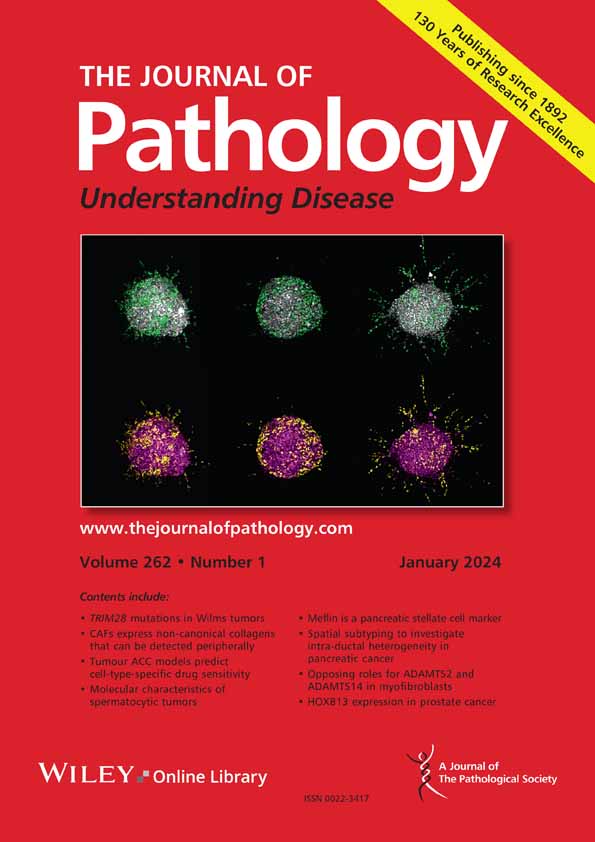PI3 expression predicts recurrence after chemotherapy with DNA-damaging drugs in gastric cancer
Kenji Harada, Naoya Sakamoto, Takumi Kitaoka, Yuka Nakamura, Ryotaro Kondo, Ryo Morisue, Hiroko Hashimoto, Yusuke Yamamoto, Shoichi Ukai, Ryota Maruyama, Shingo Sakashita, Motohiro Kojima, Kazuaki Tanabe, Hideki Ohdan, Kohei Shitara, Takahiro Kinoshita, Genichiro Ishii, Wataru Yasui, Atsushi Ochiai, Shumpei Ishikawa
下载PDF
{"title":"PI3 expression predicts recurrence after chemotherapy with DNA-damaging drugs in gastric cancer","authors":"Kenji Harada, Naoya Sakamoto, Takumi Kitaoka, Yuka Nakamura, Ryotaro Kondo, Ryo Morisue, Hiroko Hashimoto, Yusuke Yamamoto, Shoichi Ukai, Ryota Maruyama, Shingo Sakashita, Motohiro Kojima, Kazuaki Tanabe, Hideki Ohdan, Kohei Shitara, Takahiro Kinoshita, Genichiro Ishii, Wataru Yasui, Atsushi Ochiai, Shumpei Ishikawa","doi":"10.1002/path.6400","DOIUrl":null,"url":null,"abstract":"<p>Despite recent advances in gastric cancer therapy, chemotherapy resistance and lack of methods for selecting combination regimens remain major problems. Organoids, which provide a culture system that more closely resembles tumor cell organization than traditional cell lines, can be established from surgical specimens with a high success rate and are widely used for drug sensitivity assays. In this study, we aimed to identify a novel biomarker for predicting multidrug resistance using gastric cancer organoids (GCOs). We evaluated 5-fluorouracil or oxaliplatin-resistant GCOs to find novel biomarkers that reflect multidrug resistance in gastric cancer. To examine the resistance mechanisms, RNA-sequencing analysis and <i>ex vivo</i> drug sensitivity testing were performed. The association of biomarkers with patient prognosis and chemotherapy efficacy was evaluated using three original cohorts with a total of 230 cases. The results were also validated with two independent public cohorts and single-cell RNA sequence data. Increased expression of peptidase inhibitor 3 (<i>PI3</i>) was detected in all 5-fluorouracil or oxaliplatin-resistant GCOs. Our findings suggest a potential association of <i>PI3</i> expression with ribosome biosynthesis and RNA metabolism under organoid conditions. We also found that <i>PI3</i> overexpression promoted 5-fluorouracil/oxaliplatin/cisplatin resistance but not paclitaxel resistance. Immunohistochemical evaluation of PI3 expression revealed that the PI3-positive gastric cancer group had a poorer outcome, especially in terms of time to recurrence. PI3 positivity was also an independent predictor of relapse after chemotherapy with DNA-damaging agents. <i>PI3</i> promotes DNA-damaging drug resistance through multiple downstream regulations related to RNA and ribosomal metabolism. <i>PI3</i> may be useful as a biomarker for the therapeutic selection of non-DNA-damaging agents. © 2025 The Author(s). <i>The Journal of Pathology</i> published by John Wiley & Sons Ltd on behalf of The Pathological Society of Great Britain and Ireland.</p>","PeriodicalId":232,"journal":{"name":"The Journal of Pathology","volume":"265 4","pages":"472-485"},"PeriodicalIF":5.2000,"publicationDate":"2025-02-20","publicationTypes":"Journal Article","fieldsOfStudy":null,"isOpenAccess":false,"openAccessPdf":"https://onlinelibrary.wiley.com/doi/epdf/10.1002/path.6400","citationCount":"0","resultStr":null,"platform":"Semanticscholar","paperid":null,"PeriodicalName":"The Journal of Pathology","FirstCategoryId":"3","ListUrlMain":"https://pathsocjournals.onlinelibrary.wiley.com/doi/10.1002/path.6400","RegionNum":2,"RegionCategory":"医学","ArticlePicture":[],"TitleCN":null,"AbstractTextCN":null,"PMCID":null,"EPubDate":"","PubModel":"","JCR":"Q1","JCRName":"ONCOLOGY","Score":null,"Total":0}
引用次数: 0
引用
批量引用
Abstract
Despite recent advances in gastric cancer therapy, chemotherapy resistance and lack of methods for selecting combination regimens remain major problems. Organoids, which provide a culture system that more closely resembles tumor cell organization than traditional cell lines, can be established from surgical specimens with a high success rate and are widely used for drug sensitivity assays. In this study, we aimed to identify a novel biomarker for predicting multidrug resistance using gastric cancer organoids (GCOs). We evaluated 5-fluorouracil or oxaliplatin-resistant GCOs to find novel biomarkers that reflect multidrug resistance in gastric cancer. To examine the resistance mechanisms, RNA-sequencing analysis and ex vivo drug sensitivity testing were performed. The association of biomarkers with patient prognosis and chemotherapy efficacy was evaluated using three original cohorts with a total of 230 cases. The results were also validated with two independent public cohorts and single-cell RNA sequence data. Increased expression of peptidase inhibitor 3 (PI3 ) was detected in all 5-fluorouracil or oxaliplatin-resistant GCOs. Our findings suggest a potential association of PI3 expression with ribosome biosynthesis and RNA metabolism under organoid conditions. We also found that PI3 overexpression promoted 5-fluorouracil/oxaliplatin/cisplatin resistance but not paclitaxel resistance. Immunohistochemical evaluation of PI3 expression revealed that the PI3-positive gastric cancer group had a poorer outcome, especially in terms of time to recurrence. PI3 positivity was also an independent predictor of relapse after chemotherapy with DNA-damaging agents. PI3 promotes DNA-damaging drug resistance through multiple downstream regulations related to RNA and ribosomal metabolism. PI3 may be useful as a biomarker for the therapeutic selection of non-DNA-damaging agents. © 2025 The Author(s). The Journal of Pathology published by John Wiley & Sons Ltd on behalf of The Pathological Society of Great Britain and Ireland.
PI3表达可预测胃癌患者接受DNA损伤药物化疗后的复发情况。
尽管近年来胃癌治疗取得了进展,但化疗耐药和缺乏选择联合方案的方法仍然是主要问题。类器官提供了一种比传统细胞系更接近肿瘤细胞组织的培养系统,可以从手术标本中以高成功率建立,并广泛用于药物敏感性试验。在这项研究中,我们旨在鉴定一种新的生物标志物,用于预测胃癌类器官(GCOs)的多药耐药。我们评估了5-氟尿嘧啶或奥沙利铂耐药GCOs,以寻找反映胃癌多药耐药的新生物标志物。为了研究耐药机制,进行了rna测序分析和体外药敏试验。生物标志物与患者预后和化疗疗效的关系通过三个原始队列(共230例)进行评估。结果还通过两个独立的公共队列和单细胞RNA序列数据得到验证。在所有5-氟尿嘧啶或奥沙利铂耐药GCOs中均检测到肽酶抑制剂3 (PI3)表达升高。我们的研究结果表明,在类器官条件下,PI3的表达可能与核糖体生物合成和RNA代谢有关。我们还发现,PI3过表达促进5-氟尿嘧啶/奥沙利铂/顺铂耐药,但不促进紫杉醇耐药。免疫组化检测PI3表达结果显示,PI3阳性胃癌组预后较差,尤其是在复发时间方面。PI3阳性也是dna损伤药物化疗后复发的独立预测因子。PI3通过与RNA和核糖体代谢相关的多种下游调控促进dna损伤性耐药。PI3可能是一种有用的生物标志物,用于治疗选择非dna损伤剂。©2025作者。《病理学杂志》由John Wiley & Sons Ltd代表大不列颠和爱尔兰病理学会出版。
本文章由计算机程序翻译,如有差异,请以英文原文为准。








